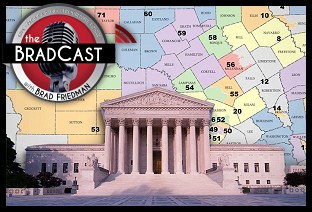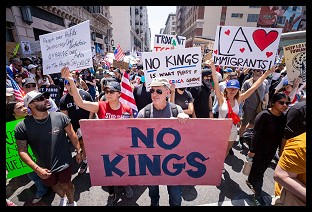 The good news for voters, of late, keeps coming --- at least against the title wave of GOP voter suppression laws instituted around the country by Republicans since taking over legislatures and executive branches in 2010.
The good news for voters, of late, keeps coming --- at least against the title wave of GOP voter suppression laws instituted around the country by Republicans since taking over legislatures and executive branches in 2010.
In addition to last week's temporary injunction of the Wisconsin's GOP polling place Photo ID restriction, and today's permanent injunction of the same law by a second judge in a separate complaint (both judges found the law in strict violation of the state Constitution's ironclad guarantee of the right to vote), today also saw the U.S. Dept. of Justice blocking a similarly disenfranchising Photo ID restriction enacted last year by Texas Republicans.
Currently, according to data supplied to the DoJ by the state of TX, more than 600,000 legally registered voters do not possess the type of ID that would be required to vote under the law passed last year, as previously set to take effect before this year's Presidential Election.
But it is the discriminatory effect of the new law which led the DoJ to nix the new changes to TX' voting laws.
Finding that the state's own statistics reveal legally registered Hispanic voters will be disproportionately disenfranchised by the TX law --- by anywhere from 46% to 120% over non-Hispanics, depending upon which set of a data submitted by TX is used for the analysis --- the DoJ rejected the statute under Section 5 of the Voting Rights Act. That section of the federal law requires preclearance for new election laws in certain jurisdictions with a history of racial discrimination. Texas is one of those covered jurisdiction.
Today, the DoJ objected to the new law after determining that the state had not met it's "burden of showing that a submitted change [to an election law] has neither a discriminatory purpose nor a discriminatory effect"...
The finding was based on an analysis of two different sets of data submitted by TX to the DoJ for review in their Section 5 examination of the new law. Both sets were sent following a series of questions for TX by the DoJ last September when the federal agency also rejected the state's new Congressional redistricting plan, as similarly passed by Republicans and signed into law by Gov. Rick Perry (R).
At the time, the DoJ had determined that TX had created the new voting districts "at least in part, for the purpose of diminishing the ability of citizens of the United States, on account of race, color, or membership in a language minority group, to elect their preferred candidates of choice to Congress."
The redistricting was found to be purposely discriminatory and was rejected by the DoJ under Section 5 of the VRA.
In reviewing the state's data on Photo ID --- no matter which of the two data sets were reviewed --- Hispanics, who make up approximately 22% of the state's legally registered voters, were found far and away more likely than non-Hispanics to be disenfranchised by the GOP's new polling place laws.
According to the 6-page letter [PDF] sent by the DoJ to the Director of Elections in the office of the TX Secretary of State today to inform him of the objection, while the state offered no explanation for the disparities in the two different data sets, examination of both indicates a seriously disproportional racial disadvantage for Hispanic voters under the new law [emphasis added]:
Our analysis of the January data indicates that 10.8 percent of Hispanic registered voters do not have a driver’s license or personal identification card issued by DPS [Dept. of Personal Safety], but only 4.9 percent of non-Hispanic registered voters do not have such identification. So, Hispanic registered voters are more than twice as likely as non-Hispanic registered voters to lack such identification. Under the data provided in January, Hispanics make up only 21.8 percent of all registered voters, but fully 38.2 percent of the registered voters who lack these forms of identification.
Thus, we conclude that the total number of registered voters who lack a driver’s license or personal identification card issued by DPS could range from 603,892 to 795,955. The disparity between the percentages of Hispanics and non-Hispanics who lack these forms of identification ranges from 46.5 to 120.0 percent. That is, according to the state’s own data, a Hispanic registered voter is at least 46.5 percent, and potentially 120.0 percent, more likely than a non-Hispanic registered voter to lack this identification. Even using the data most favorable to the state, Hispanics disproportionately lack either a driver’s license or a personal identification card issued by DPS, and that disparity is statistically significant.
The DoJ letter goes on to note that "The state has provided no data on whether African American or Asian registered voters are also disproportionately affected by" the new law.
In addition to the racial disparity, the DoJ also found that it would be costly for all registered voters without the requisite forms of identification needed to procure the so-called "free" Photo IDs offered by the state, but that the costs would be more difficult for Hispanics who represent a disproportionate number of those who are impoverished in Texas:
Finally, the DoJ detailed three additional hurdles that all voters, but disproportionately Hispanic voters, according to the state's data, are likely to face in attempting to obtain their so-called "free" ID, if they do not already have one deemed suitable for voting purposes in Texas:
...
Second, in 81 of the state’s 254 counties, there are no operational driver’s license offices. The disparity in the rates between Hispanics and non-Hispanics with regard to the possession of either a driver’s license or personal identification card issued by DPS is particularly stark in counties without driver’s license offices. According to the September 2011 data, 10.0 percent of Hispanics in counties without driver’s license offices do not have either form of identification, compared to 5.5 percent of non-Hispanics. According to the January 2012 data, that comparison is 14.6 percent of Hispanics in counties without driver’s license offices, as compared to 8.8 percent of non-Hispanics. During the legislative hearings, one senator stated that some voters in his district could have to travel up to 176 miles roundtrip in order to reach a driver’s license office. The legislature tabled amendments that would have, for example, provided reimbursement to voters who live below the poverty line for travel expenses incurred in applying for the requisite identification.
The third and final point is the limited hours that such offices are open. Only 49 of the 221 currently open driver’s license offices across the state have extended hours. Even Senator Troy Fraser, the primary author of this legislation in the Senate, acknowledged during the legislative hearing that, "You gotta work to make sure that [DPS offices] are open." Despite the apparent recognition of the situation, the legislature tabled an amendment that would have required driver’s license offices to be open until 7:00 p.m. or later on at least one weekday and during four or more hours on at least two Saturdays each month.
Many of the DoJ's findings mirror those found last year when they rejected the state of South Carolina's similarly disenfranchising polling place Photo ID restriction law. In that case, it was determined that the state's own data showed that registered African-American voters in the state were more than 20% more likely to lack the requisite Photo ID than registered White voters.
Both Texas and South Carolina have appealed the DoJ rulings to the U.S. District Court in Washington D.C. In both cases, however, as noted by the DoJ today, "until the objection is withdrawn or a judgment from the United States District Court for the District of Columbia is obtained, the submitted changes continue to be legally unenforceable."
Critics of polling place Photo ID laws have long charged, with a great deal of evidence to support their case, that such restrictions are specifically targeted toward the elderly, minorities and student voters, all of whom tend to lack the needed ID, and all of whom tend to vote disproportionately in favor of Democrats.
Republican proponents of such laws claim they are necessary to combat voter fraud, though none of them have succeeded in demonstrating any actual incidents of polling place impersonation --- the only type of voter fraud that can possibly be deterred by such laws.
Indiana's first-in-the-nation Photo ID restriction law was granted narrow approval by the U.S. Supreme Court in 2008. Since then, elderly nuns and students, among others who had previously been legal voters, have been disenfranchised by the law. Ironically, last month the Republican Sec. of State of Indiana, Charlie White, was found guilty of six felony charges, three of them for voter fraud, after it was determined that he'd registered to vote at an address where he did not live. The state's law did nothing to prevent White's fraud.
The same year that Indiana's law was approved, political appointees in the Bush Administration's DoJ granted VRA preclearance to Georgia's Republican-approved Photo ID law against the advice of the career attorneys in the Civil Rights Division.
Currently the DoJ is set to review a Photo ID referendum approved by voters in Mississippi last January, and another is pending in Alabama as well. Both states are among the 16 "covered jurisdictions" where preclearance is required under Section 5 of the VRA.
In other states which are not covered by Section 5, such as Kansas, Tennessee, Rhode Island, Pennsylvania and Wisconsin, Republicans have passed Photo ID restrictions and those are currently being challenged at the state level. The BRAD BLOG's legal analyst Ernest A. Canning recently argued that the DoJ should intervene in such cases under Section 2 of the Voting Rights Act, which also prohibits racially discriminatory election laws, but where the burden is on the challenging party to demonstrate a discriminatory intent or effect, rather than on the jurisdiction itself --- as in Section 5 states --- to demonstrate new changes to the law are not discriminatory.
As Ari Berman reported last week at Rolling Stone, a concerted effort by Republicans since taking power in many swing states in 2010 is currently underway to implement these restrictive laws before the 2012 Presidential Election. Most of the new laws, he notes, are based on the same template legislation offered by the American Legislative Exchange Council (ALEC), a Rightwing DC-based non-profit which is funded, in no small part, by major corporate interests and whose membership includes many of the elected state officials who have sponsored the new laws in more than a dozen states over the past year.


 SCOTUS Ruling a How-To for Unlawful Gerrymandering on 'Eve' of Critical Election Year: BradCast' 12/17/25
SCOTUS Ruling a How-To for Unlawful Gerrymandering on 'Eve' of Critical Election Year: BradCast' 12/17/25 Bricks in the Wall:
Bricks in the Wall: 'Green News Report' 12/16/25
'Green News Report' 12/16/25
 'This One Goes to 11': Weekend of Violence, Tragic Murder of Rob Reiner: 'BradCast' 12/15
'This One Goes to 11': Weekend of Violence, Tragic Murder of Rob Reiner: 'BradCast' 12/15 Sunday 'WTF?' Toons
Sunday 'WTF?' Toons Trump Now Losing One
Trump Now Losing One 'Green News Report' 12/11/25
'Green News Report' 12/11/25 Dems Continue Stunning 2025 Election Streak: 'BradCast' 12/10/25
Dems Continue Stunning 2025 Election Streak: 'BradCast' 12/10/25 Petrostates and Propagandists Undermining Climate Science: 'BradCast' 12/9/25
Petrostates and Propagandists Undermining Climate Science: 'BradCast' 12/9/25 'Green News Report' 12/9/25
'Green News Report' 12/9/25 The High Cost of Trump's Terrible Policy Making: 'BradCast' 12/8/25
The High Cost of Trump's Terrible Policy Making: 'BradCast' 12/8/25 Sunday 'All in a Day's Work' Toons
Sunday 'All in a Day's Work' Toons Dems Fight to Avoid the GOP's Massive, Year-End Health Care Cliff: 'BradCast' 12/4/25
Dems Fight to Avoid the GOP's Massive, Year-End Health Care Cliff: 'BradCast' 12/4/25 'Green News Report' 12/4/25
'Green News Report' 12/4/25 A 'Flashing Red Warning Sign' for GOP: 'BradCast' 12/3/25
A 'Flashing Red Warning Sign' for GOP: 'BradCast' 12/3/25 Hegseth, War Crimes and DoD's 'Politicization Death Spiral': 'BradCast' 12/2/25
Hegseth, War Crimes and DoD's 'Politicization Death Spiral': 'BradCast' 12/2/25 Follow the
Follow the  With Thanks, No Kings and Good Cheer
With Thanks, No Kings and Good Cheer Presidential Illegality and Duty to Disobey
Presidential Illegality and Duty to Disobey President of United States Calls for Killing Democratic Officials: 'BradCast' 11/20/25
President of United States Calls for Killing Democratic Officials: 'BradCast' 11/20/25 Is MAGA Finally Beginning to Fall Apart?: 'BradCast' 11/19/25
Is MAGA Finally Beginning to Fall Apart?: 'BradCast' 11/19/25 Trump's Terrible, Horrible, No Good, Very Bad Week: 'BradCast' 11/18/25
Trump's Terrible, Horrible, No Good, Very Bad Week: 'BradCast' 11/18/25
 VA GOP VOTER REG FRAUDSTER OFF HOOK
VA GOP VOTER REG FRAUDSTER OFF HOOK Criminal GOP Voter Registration Fraud Probe Expanding in VA
Criminal GOP Voter Registration Fraud Probe Expanding in VA DOJ PROBE SOUGHT AFTER VA ARREST
DOJ PROBE SOUGHT AFTER VA ARREST Arrest in VA: GOP Voter Reg Scandal Widens
Arrest in VA: GOP Voter Reg Scandal Widens ALL TOGETHER: ROVE, SPROUL, KOCHS, RNC
ALL TOGETHER: ROVE, SPROUL, KOCHS, RNC LATimes: RNC's 'Fired' Sproul Working for Repubs in 'as Many as 30 States'
LATimes: RNC's 'Fired' Sproul Working for Repubs in 'as Many as 30 States' 'Fired' Sproul Group 'Cloned', Still Working for Republicans in At Least 10 States
'Fired' Sproul Group 'Cloned', Still Working for Republicans in At Least 10 States FINALLY: FOX ON GOP REG FRAUD SCANDAL
FINALLY: FOX ON GOP REG FRAUD SCANDAL COLORADO FOLLOWS FLORIDA WITH GOP CRIMINAL INVESTIGATION
COLORADO FOLLOWS FLORIDA WITH GOP CRIMINAL INVESTIGATION CRIMINAL PROBE LAUNCHED INTO GOP VOTER REGISTRATION FRAUD SCANDAL IN FL
CRIMINAL PROBE LAUNCHED INTO GOP VOTER REGISTRATION FRAUD SCANDAL IN FL Brad Breaks PA Photo ID & GOP Registration Fraud Scandal News on Hartmann TV
Brad Breaks PA Photo ID & GOP Registration Fraud Scandal News on Hartmann TV  CAUGHT ON TAPE: COORDINATED NATIONWIDE GOP VOTER REG SCAM
CAUGHT ON TAPE: COORDINATED NATIONWIDE GOP VOTER REG SCAM CRIMINAL ELECTION FRAUD COMPLAINT FILED AGAINST GOP 'FRAUD' FIRM
CRIMINAL ELECTION FRAUD COMPLAINT FILED AGAINST GOP 'FRAUD' FIRM RICK SCOTT GETS ROLLED IN GOP REGISTRATION FRAUD SCANDAL
RICK SCOTT GETS ROLLED IN GOP REGISTRATION FRAUD SCANDAL VIDEO: Brad Breaks GOP Reg Fraud Scandal on Hartmann TV
VIDEO: Brad Breaks GOP Reg Fraud Scandal on Hartmann TV RNC FIRES NATIONAL VOTER REGISTRATION FIRM FOR FRAUD
RNC FIRES NATIONAL VOTER REGISTRATION FIRM FOR FRAUD EXCLUSIVE: Intvw w/ FL Official Who First Discovered GOP Reg Fraud
EXCLUSIVE: Intvw w/ FL Official Who First Discovered GOP Reg Fraud GOP REGISTRATION FRAUD FOUND IN FL
GOP REGISTRATION FRAUD FOUND IN FL

































